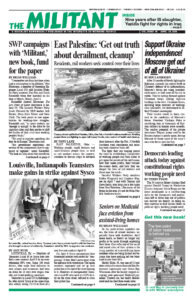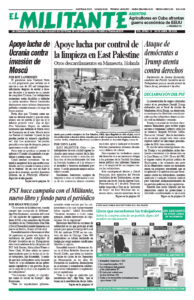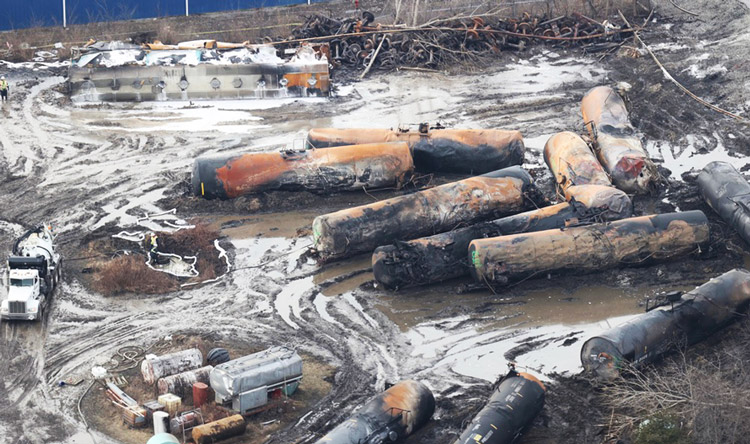EAST PALESTINE, Ohio — Working people, small farmers and small-business people here, as well as rail workers across the country, continue to discuss steps to advance their interests after the Feb. 3 Norfolk Southern train derailment and ensuing toxic chemical burn-off.
The fight they are waging points the road to establishing committees of working people and their allies to pry open the secrets of the rail bosses, how they make profits, their behind-the-scenes deals, and how they endanger the lives of rail workers and those near the tracks.
Socialist Workers Party members Kathie Fitzgerald and Candace Wagner on April 7 met with Tammy and Dave Reidy, who farm just a few miles from East Palestine. Like many of the farms in the area, it’s not far from Norfolk Southern tracks.
The day of the derailment, and again after the “burn,” Dave said, “it smelled like burning plastic, a smell that lingered. When the dew was heavy it burned your nose.” The Reidys have a small herd of beef cattle, hogs, goats, ducks, chickens and two donkeys. Tammy said since the derailment they’ve had stillborns, a calf and two goats, one just that morning. She said this hadn’t happened before.
“Everybody’s worrying about the soil. What about three years from now?” Dave Reidy said. “Should we make hay? Put in corn? They ain’t telling us nothing!”
They signed up for the soil and water testing being financed by Norfolk Southern and haven’t heard anything yet. And while they’re not sure about the accuracy of those tests, Tammy Reidy said, “If you do the tests yourself, you don’t know if you’ll get reimbursed.” The tests cost a couple hundred dollars, she said.
Both of them work full time, Dave Reidy doing maintenance for a nearby township and Tammy Reidy as a nurse at a local hospital. Although they both want to be full-time farmers, this is the only way for them to keep going.
We showed them the Militant coverage of a convoy from Indianapolis that brought donations of animal feed to Freedom Farm in nearby Salem two weeks ago. “We helped with that,” Dave Reidy said. “We ended up spending the day helping unload the arriving trucks. It was a good thing to do.”
“That sort of solidarity is important,” Fitzgerald said. “What we need is to organize committees with members of unions, workers and of farmers who could work together and say to the railroad, ‘Hey, we want to see your books, how much are you really making and what are you spending on maintenance and safety?’ They could demand the Environmental Protection Agency and Department of Natural Resources turn over the actual test results.”
Tammy Reidy was skeptical of farmers being able to change things. But the fact is there were big mobilizations of farmers and unionists in the 1930s and ’80s that beat back attacks by the big agribusiness monopolies and made gains.
Because of the public outcry, the Salem News reported the Ohio Department of Agriculture began testing farm crops April 10, starting with Lindsay’s Pine Hill Jersey Farm in New Waterford.
Rogers Mill manufactures and sells animal feed and supplies near the derailment site. “One of our customers can’t sell their eggs and I’ve heard that some can’t sell beef,” owner Cindy Black told the Militant worker-correspondents. “I heard of one farmer who lost a sale because the customer was afraid and backed out after slaughter and butchering without paying the processing fee.”
Disbelief at actions of rail bosses
Jillian Zuch, a worker at the store and an East Palestine resident, said, “My grandpa worked for the railroad. He told me that for the company it was always, ‘Get the trains running again then worry about the cleanup later.’ He can’t believe the car inspectors only have 60 seconds now to inspect the cars.”
Both Black and Kathleen Unkefer, a worker in the florist shop in East Palestine who we visited later, reacted strongly against efforts by rail bosses to blame local officials for the burn-off after the derailment.
“When I saw that [Norfolk Southern CEO Alan] Shaw was saying that the East Palestine fire chief made the decision to burn all those dangerous chemicals, I wanted to claw my way into the TV and give him a piece of my mind! You’ve got to be kidding me,” Black told us.
Unkefer said she too was angered by CEO Shaw’s trying to deny responsibility for the “controlled burn.”
“Our fire chief is really new,” she said. “He came in the store that Friday to introduce himself. His mother goes to my church and I asked her how he was doing and she said not at all well.”
The cleanup of the railroad tracks in East Palestine continues, with attention now turning to the northern set of tracks. This was one of the first victories won by the pressure of area residents who demanded the tracks be torn up and the soil removed. Norfolk Southern bosses had rebuilt them right after the burn-off to start generating profits again.
Concern about how the contaminated soil and water are being shipped to sites across the country has led to a pushback. Local authorities aren’t consulted about the shipments and some are dumped in area landfills.
In Baltimore, Clean Harbors abandoned a plan to treat contaminated runoff water from the derailment cleanup after city officials blocked it from using the sewer system.
Steps like this slow down the process of getting the contaminated waste out of East Palestine.
According to the Ohio EPA, approximately 10.8 million gallons of liquid wastewater have been hauled away. Some 18,900 tons of contaminated soil has been shipped out, with 17,400 tons still piled up in East Palestine.
The hazards this process threatens were highlighted when a semi-truck spilled 20,000 pounds of contaminated soil after running off the road and overturning in Unity Township April 10. Ohio officials say the spill didn’t threaten nearby waterways.
This shows once again the need for area residents to have control over all aspects of the cleanup.
Trains too long, too heavy
The anger of working people over the disaster and from the fight waged by rail unions over conditions and crew size have brought to light the disregard for safety by rail bosses in their pursuit of profits.
One result of the pressure is an April Federal Railroad Administration “safety advisory” documenting six derailments, where train “make-up” — that is how rail bosses tell workers to put cars together to form trains — was said to be the cause.
Each of the trains that derailed had 125 or more cars. All exceeded 4,000 trailing tons, the maximum weight threshold established by the American Association of Railroads 1992 Train Make-up Manual. And five of the six trains were made up of mixed freight, including loaded and empty cars, as well as hazardous material. Such longer, heavier mixed freight trains involve more challenges handling characteristics than unit trains of the same type of cars.
Rail unions have targeted these dangers. “This increase in derailments is what happens,” Clyde Whitaker, Ohio state legislative director for the SMART-Transportation Division union, told a March 22 U.S. Senate hearing, when you “run longer, heavier trains that are harder to control.”
SMART-TD President Jeremy Ferguson also took this up, responding to a letter by Joseph Biden’s Transportation Secretary, Pete Buttigieg. Ferguson said the rail bosses’ drive for profits had led to “exponential increases to train length, less consideration to train make-up or construction, the desire to reduce crew size and introduce automation, the reduction in frequency and quality of inspections to equipment and infrastructure.”
Even after documenting the problems train make-up creates today, the Federal Railroad Administration just recommends companies review train “policies and procedures” and all personnel “receive appropriate training.” This is a recipe for putting the blame on train crews for future derailments. Only a fight for shorter trains with larger crews, where rail workers get to exercise some control over their work situation, can reduce derailments.
When the FRA first set out to look at the dangers of longer and heavier trains in 2016, rail bosses refused to hand over enough data to allow investigators to make findings.
Meanwhile, derailments continue. Two Norfolk Southern crew members were injured April 8 when a locomotive and 11 cars derailed in Jasper, Alabama. Diesel fuel and engine oil spilled.
And the battle over crew size continues. NBC News reported on a nearly milelong train whose locomotive was being driven with a remote control that did a 6-mile run across Houston between two Union Pacific yards. Thirty-six of the cars carried hazardous materials. Efren Gonzalez, the owner of Azteca Farmers Market along the route, said the only warning was a few signs along the track saying, “Locomotive cars may be unoccupied.”
At the same time, CSX bosses reached a tentative agreement with the SMART-TD union to allow five paid sick days a year. This was one of rail workers’ demands brushed aside when the Biden administration led a bipartisan Congress to ban any rail strike last fall.


